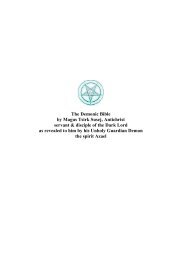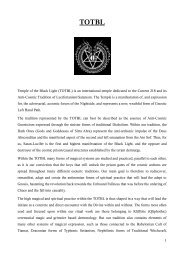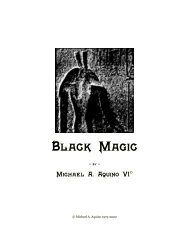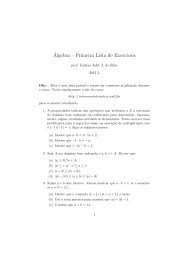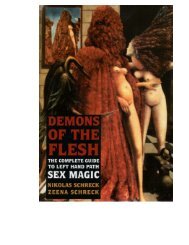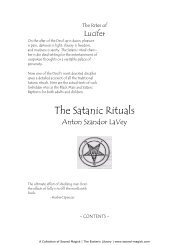Satanism Today - An Encyclopedia of Religion, Folklore and Popular ...
Satanism Today - An Encyclopedia of Religion, Folklore and Popular ...
Satanism Today - An Encyclopedia of Religion, Folklore and Popular ...
You also want an ePaper? Increase the reach of your titles
YUMPU automatically turns print PDFs into web optimized ePapers that Google loves.
Halloween 103<br />
body, which is considered a form <strong>of</strong> prison. Now<br />
in its naked reality, the soul is judged in a meadow<br />
at the intersection <strong>of</strong> two roads—one leads to the<br />
Isles <strong>of</strong> the Blessed <strong>and</strong> the other leads to Tartarus.<br />
The three judges are: Rhadamanthys for souls<br />
from Asia, Aeacus for souls from Europe, <strong>and</strong><br />
Minos for any cases about which there is indecision.<br />
The examination seems to be more medical<br />
than conversational. The soul is presented as<br />
marked by the actions <strong>of</strong> life, particularly in the<br />
sense <strong>of</strong> being malformed or wounded by authoring<br />
unjust actions. The judges have only to<br />
examine the marks on the soul to determine the<br />
appropriate judgment. The wicked are set on the<br />
road to Tartarus to be rehabilitated or eternally<br />
punished. The good are sent to the Isles <strong>of</strong> the<br />
Blessed, <strong>and</strong> are pictured as having lived philosophic<br />
lives. In Homeric mythology, Tartarus was<br />
a region underneath Hades where rebellious<br />
deities, particularly the Titans, were sent for<br />
punishment. In this dialogue, it has been transformed<br />
into a general place <strong>of</strong> punishment.<br />
In the afterlife myth in the Phaedo, the judgment<br />
<strong>of</strong> the dead is supposed to take place at the<br />
Acherusian Lake. The incurable evil ones will<br />
spend an eternity <strong>of</strong> punishment in Tartarus. The<br />
curable evil may spend only a year there. If those<br />
whom they mistreated in life agree to pardon<br />
them, they may be sent back to earth to live<br />
another life, the same fate as those who led lives <strong>of</strong><br />
goodness. Philosophical souls are granted the ultimate<br />
boon, freedom from another bodily birth<br />
<strong>and</strong> an eternity <strong>of</strong> contemplation among beautiful<br />
surroundings.<br />
In the Republic, the afterlife is described by a<br />
man who had what today would be termed a<br />
“near-death experience.” In his long <strong>and</strong> detailed<br />
story, the soul is supposed to journey to a place<br />
where there are two openings into the earth <strong>and</strong><br />
two openings into the sky. Judges sit in the middle<br />
<strong>and</strong> send the good souls up one <strong>of</strong> the upper<br />
openings <strong>and</strong> the evil soul down one <strong>of</strong> the lower<br />
openings. There, the souls are either rewarded or<br />
punished tenfold for one thous<strong>and</strong> years. After<br />
that time the souls come down or go up to the<br />
other openings <strong>and</strong> meet together in a meadow to<br />
swap experiences. The worst souls do not emerge,<br />
but are thrown forever into Tartarus.<br />
See also Cerberus; Underworld<br />
For Further Reading:<br />
Eliade, Mircea, ed. <strong>Encyclopedia</strong> <strong>of</strong> <strong>Religion</strong>. New<br />
York: Macmillan, 1987.<br />
Grant, Michael, <strong>and</strong> John Hazel. Who’s Who in<br />
Classical Mythology. New York: Oxford<br />
University Press, 1993.<br />
Hamilton, Edith, <strong>and</strong> Huntington Cairns, eds. The<br />
Collected Dialogues <strong>of</strong> Plato. Princeton, NJ:<br />
Princeton University Press, 1961.<br />
MacGregor, Geddes. Images <strong>of</strong> Afterlife: Beliefs from<br />
<strong>An</strong>tiquity to Modern Times. New York: Paragon<br />
House, 1992.<br />
North, Helen F. “Death <strong>and</strong> Afterlife in Greek Tragedy<br />
<strong>and</strong> Plato.” In Hiroshi Obayashi, ed. Death <strong>and</strong><br />
Afterlife: Perspectives <strong>of</strong> World <strong>Religion</strong>s. Westport,<br />
CT: Greenwood Press, 1992, 49–64.<br />
Smart, Ninian. The Religious Experience <strong>of</strong> Mankind.<br />
3rd ed. New York: Charles Scribner’s Sons, 1984.<br />
Tripp, Edward. The Meridian H<strong>and</strong>book <strong>of</strong> Classical<br />
Mythology. New York: New American Library,<br />
1970.<br />
Werblowsky, R. J. Zwi. “Transmigration.” In Mircea<br />
Eliade, ed. <strong>Encyclopedia</strong> <strong>of</strong> <strong>Religion</strong>. New York:<br />
Macmillan, 1987.<br />
Halloween<br />
The holiday we designate as Halloween (All<br />
Hallows Eve) has its roots in the Day <strong>of</strong> the<br />
Dead—a day when, to speak metaphorically, the<br />
veil between this world <strong>and</strong> the other world was<br />
“thin.” The present date <strong>of</strong> All Hallows Eve was set<br />
by the Catholic Church, which took over the<br />
ancient Roman Day <strong>of</strong> the Dead, Feralia, <strong>and</strong><br />
transferred it to the first <strong>of</strong> November. All Hallows<br />
Eve blended with certain northern European<br />
beliefs to give the Halloween familiar to most<br />
Americans its current associations with demons<br />
<strong>and</strong> the powers <strong>of</strong> evil.<br />
The tradition <strong>of</strong> costumed children going to<br />
door to door asking for food is an echo <strong>of</strong> the<br />
ancient practice <strong>of</strong> providing food for the spirits <strong>of</strong><br />
the departed. For the most part, citizens <strong>of</strong> the<br />
modern world have forgotten the original<br />
meaning <strong>of</strong> Halloween. As a children’s holiday<br />
Halloween was widely celebrated until relatively<br />
recently, when safety concerns severely reduced<br />
the number <strong>of</strong> trick-or-treaters. Many conservative<br />
Protestants also came to regard Halloween as<br />
a diabolical celebration, <strong>and</strong> struck it from their<br />
holiday calendar.




